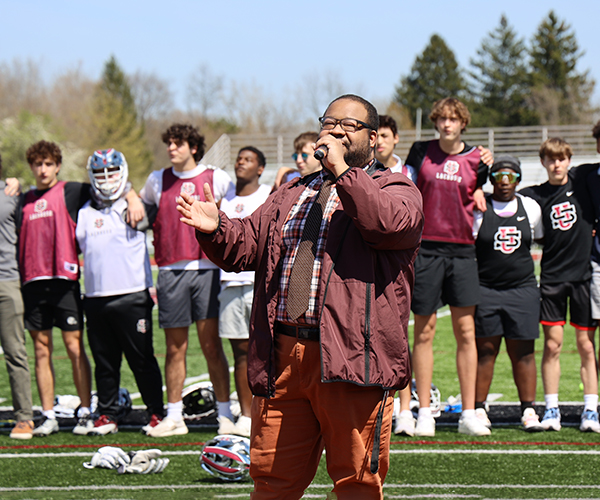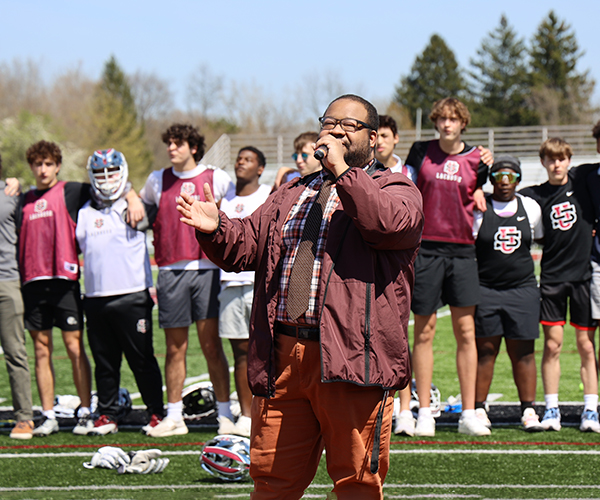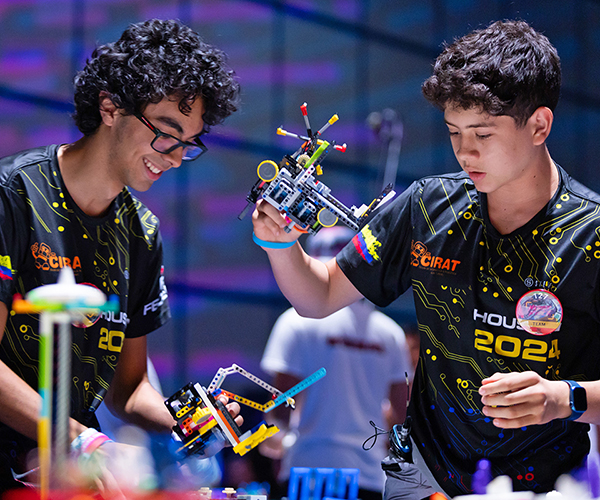Q: How can students stay organized through a hectic school week?
A: "The most important thing for students is to find and utilize a system that consistently works well for them. It can be color coding all of their classes, and then keeping everything together in those color codes," says Jason Culp, head of the upper school at Lawrence School. "If red is history, then the folder can be red. All of those materials can easily be found so students can go back through and look at what they need. I also think it's helpful for students to utilize an assignment notebook where they can document what's going on in their classes and what they need to be completing in the evening so that parents can review that consistently together. Students will feel less anxious and less stressed out."
Q: How can technology enhance learning?
A: "Technology enhances learning by increasing the opportunities for connections and repetitions. Learning is a constructive act. We learn from what we know. To be able to take something apart and put it back together is important in the classroom," says Larry Goodman, head of the Lillian and Betty Ratner School. "The richest and the most prolific learning takes place in environments with the most opportunities to connect dots. Through electronic media, we're able to connect thoughts, ideas, people and concepts with dizzying complexity. The opportunities for learning increase exponentially."
Q: Why is it important to allow a child to express creativity and imagination in an academic setting?
A: "It improves the quality and joy in learning when you are able to use your imagination," says Susan Sadler, associate head of school at Hathaway Brown. "Children use higher-level thinking to take information they see and sense around them and put it together to create something. It's important that kids are able to adapt and improve their powers of problem solving and creativity to adjust to anything that comes their way. There's a tremendous amount of beauty in imagination. It's a great thing for kids to dwell on. We want to unleash their maximum potential in life."
Q: How can a student find the right activity for him/her?
A: "Early on in the school year we have an activities and extracurriculars fair where everything that we have available to the boys is represented on campus throughout the day and after school is over," says Dan Bradesca, principal of St. Ignatius High School. "Clubs, the moderators and the students that are already involved are all there at tables throughout campus to advertise what is available. I refer to them as co-curriculars, because it's really part of the complete educational experience. The students can teach each other through their experiences. It's essential that a student gets involved in something on campus, whether it be athletics, the arts or one of these co-curriculars."
Q: What is the importance of getting involved outside of the regular class schedule?
A: "It's a way for students to try on different hats as they develop intellectually and cognitively, so they can find their strengths and interests," says Arin Miller-Tait, senior class adviser and teacher at Gilmour Academy. "It gives them a chance to see how what happens in the classroom applies elsewhere, whether that's in service or starting a business. There's also the scheduling component of it. We know as adults that the busier we are sometimes, the better we manage our time. It gives them a chance to feel out that process a little bit, to manage a schedule, to make appointments and to be where they say they're going to be."
Q: Why do you feel experiential learning should be required within a college education?
A: "Some students need a nudge to something that's good for them, so that's what this requirement is doing," says Janet Stocks, Baldwin Wallace University's associate academic dean. "Learning to apply more theoretical or abstract things to real world situations can really solidify for students the things they're learning in the classroom and can help them understand why they're learning certain things. Once they've had the experiences, they can articulate the value of the things they're learning for application to real world situations. We have a lot of different kinds of experiential learning that happens on campus, like study abroad, undergraduate research, internships, and service learning, so it's making sure all students participate, not just some."
Q: What is the importance of individualized teaching?
A: "Because it's built in to the philosophical frameworks of what we do, one-on-one teaching can be simply the teacher and the child working together. It can also be peers working together," says Gordon Maas, head of school at Ruffing Montessori. "We don't put limits on what children are capable of doing in terms of chronological age. If a child has abilities beyond certain grade levels, they are allowed to individualize that and show us through their ability."
Q: How are you preparing teachers to properly use new technology?
A: "Children as young as 3 or 4 years old have diverse learning styles, and technology is another way to expand learning styles. Just because we're teachers, it doesn't mean we have all the answers. Technology plays a large role in that," says Jane Thornton, director of the pre-primary school at Laurel School. "We have a wonderful information resources department. They help us think about how we can incorporate technology into our curriculum and they are always available to help a faculty member brainstorm. We also send faculty members to workshops that are interesting to them. A couple of our faculty members have taken summer classes on technology, so we really gain our knowledge through a variety of ways."
Q: Why is leadership development important to a student's education?
A: "Part of the educational process should be leadership development. Whether it be a leader of society or a leader within one's own family, there are certain traits that need to be honed and developed over the long term for [a student's] own personal life and also the betterment of society," says Joe Gressock, principal of Benedictine High School. "We're going to start a priory system. It's really a house system, but we try to infuse the Rule of St. Benedict in all that we do here. We're going from about 16 leaders in the school to over 40 student leaders. They'll be running the priory system and will be directly involved with not only leadership, but also mentoring and coaching."
Q: What do schools look for in students that have to go through an admissions process?
A: "Every school has a very specific mission. I think that for every high school, they are looking for students who align with that mission. That's what makes different schools unique," says KC McKenna, vice president of marketing and admissions at St. Edward High School. "We're looking for a couple things. We're looking for students who are well prepared, academically and socially, [and] students who have a great enthusiasm for learning. Admissions is not a yes-and-no game. We want to build the best possible community. Do the students make a positive contribution to the St. Ed's community?"
Q: How do diverse learning styles prepare students for secondary and post-secondary education?
A: "Learning isn't a linear trajectory," says Jerry Isaak-Shapiro, head of the Agnon School. "Teachers need to teach differently for those who learn differently. None of us are sealed off, vacuum-packed for one type of learning. So it's important to focus on the effort, not always the result. It's not about empty praising. The struggle is good. •You don't know everything' is a great lesson to learn. We all need to have our learning enriched in the way that it is important to us."
Q: What advice do you have for students that may be struggling in school?
A: "When a student comes to the teacher, it shows that they're trying," says Trinity High School's campus minister and theology department chairman Scott Plescia. "If they are struggling with a class, see the teacher. Talk with them and see if you can get extra help. Go on the Internet. There are so many great things out there that help with different subject areas. Realistically, sometimes kids don't feel comfortable talking to their parents about personal or sensitive issues. I have an open door policy. There will never be any type of judgment."
Q: What are the advantages of attending a private school?
A: "A teacher knows the strengths and weaknesses, knows the kids and parents," says Bruce Wilhelm, the head of University School Shaker Campus. "Teachers have a significant responsibility to communicate with parents about how their children are doing. It's a community. At a good independent school, parents and the school are a team. We're going to work together to make this kid as successful as possible. There is such pressure on parents that their kids have to be really good at everything. We're average at a lot of things. Why do we expect our kids to be great at everything? Parents [just] want their kids to be happy."
Q: How do Montessori schools differ from typical private or public schools?
A: "The main difference is that all levels work in multi-age groups. We have children working in communities in three-year age spans. It gives older children the opportunities to be role models and helps motivate the younger students," says Tina Schneider, director of the Montessori School at Holy Rosary. "If they are going to do music and art, it's already built into the classroom. Rather than stopping everybody to go to a special class, it's all incorporated. One group of children might be doing a book report, another science or another baking muffins. Teachers are there to guide what the children are doing."
Q: How does something like a house system help to benefit the students of that particular school?
A: "The house system builds community. It's the time when [students] really start bonding. Our upper-level kids become mentors to the lower-school kids. The house system makes the school smaller," says Mike Shaulis, head of the upper school at Lake Ridge Academy. "Within each house, it's mixed grade levels and there are five advisories. Each adviser has seven or eight kids in their advisory. You're going to laugh, but our school is divided up into four houses like Harry Potter. We have a house cup. We have an athletic competition like the Olympics. It's very ritualistic in some ways, like initiation into a tribe."
Q: What are institutions doing to help students afford tuition in a down economy?
A: "We constantly develop scholarship programs. It is very important for us to be able to provide access to students and create school programs that are most effective," says Craig Cornell, Ohio University's vice provost for enrollment management. "We discuss every year about tuition increases, whether it happens or not. We weigh it very heavily. Every student is unique when it comes to scholarships. There are full tuition scholarships, generally, for really needy students at the highest ends of academic quality. Scholarships can add up to a significant award."
Q: How can students avoid being lost in the shuffle at a larger college?
A: "The best thing to do is establish connections, meet various people in various departments, and establish a relationship with the faculty. Outside of that, they should work with their academic adviser. But, the most important part for new students is to socially engage with organizations, athletics, anything to get involved in the university," says David Garcia, associate vice president of enrollment management at Kent State University. "It's so important for them to become part of the university, both inside and outside the classroom. Their college experience is going to be based on what they make it to be. If they spend their time sitting in a dorm room, they're not going to be very happy."
Q: What advantages do all-girls schools have in terms of empowering young women in today's culture?
A: "The biggest advantage is that the girls are more likely to take more advanced classes. They don't have to worry about not being too smart or not being pretty enough. They don't have to worry about appearance and can focus on performance," says Mary Ann Corrigan-Davis, president and 1971 graduate of St. Joseph Academy. "They can try new things in a safe environment. It's OK if they are the brainiacs and the scientists. Everybody is encouraged to be the best they can be no matter where their interests lie. There's freedom. At St. Joseph, we say we're not just an all-girls school, we're an all-kinds-of-girls school."
Q: How does music education enhance students' learning experiences?
A: "It's a myriad of things actually — it enriches our lives, evokes memories, evokes self-expression. It's a way of teaching children different concepts in a modality that is comfortable for children, especially young children," says Thea Wilson, director of early childhood education at The Music Settlement School. "It utilizes each child's unique gifts and capabilities. Then, it develops and strengthens interpersonal connections for children, which is absolutely critical at this juncture. Music surrounds our lives and is truly a part of our culture. Regardless of what background we come from, you'll find some type of music or the arts. We give children a comfortable introduction to those parts of our culture that enhance and enrich our lives as people."
Q: How does a focus on career preparation influence the college experience?
A: "When one looks at primarily adult learners, they're individuals that started a career or hit a point where they want to make a change in their path. The experience is designed to get students from point A, where they're in a job or place they may not necessarily like, to point B, somewhere better. In these economic times, there's no recession-proof career," says Jim Ploskonka, director of Ohio Colleges for Bryant & Stratton. "Jobs in manufacturing have downsized, companies have laid off employees. Adult learners, though, are able to gain more knowledge and career preparation to go into better, more secure positions. When they get that diploma and that first increased paycheck, they're happy with the results."
Q: Which areas of education do you feel deserve a little more focus than is generally given? How are you working to do this at your school?
A: "I feel education needs to look more at a developmental approach to learning, understanding how the brain processes and best uses information. The approach understands what a developing child needs most, what is most motivating. Education needs to know humans at each stage of development and how to inspire them to do deep learning," says Paula Leigh-Doyle, head of school for Hershey Montessori School. "We're developmental based and our approach, our methodology, our expectations are very much about engaging students who immerse themselves in learning and love learning. We create environments that call students to their higher selves."
Q: What are some new technologies that parents might not expect or anticipate to find in a classroom?
A: "The thing that I use most that parents would be surprised about is YouTube, since students use it primarily for entertainment. I show lectures from universities or stream interviews from international space stations. Though what I'm most excited about is new 3-D projection technology. You can take a 3-D model and project it on the board," says Maria Iannucci, science teacher at Beaumont School. "Now teachers can show something like a volcano from all sides. I show my students a model of the inside of a human ear. It brings something that students wouldn't necessarily be able to see, and it's so much better than a textbook image."
Q: How does science lend to the advancement of technology use in the classroom?
A: "You start out with science advancements, but [there is] improved technology. Then as that technology becomes available to the general public, it goes back and helps out with teaching science in the classroom, and you have that cycle back and forth. Especially in the last couple decades, there have been so many scientific advancements that have improved technology greatly," says Jim Barbarich, upper school AP science teacher at Andrews Osborne Academy. "Our students are able to do experiments and take real time measurements, and from that they are able to analyze their data right away, which is what happens in the real world. So our students get a firsthand experience of what goes on in industry and then they can apply that to whatever they decide to do afterward, which is going to help out that technology •cycle' again."



